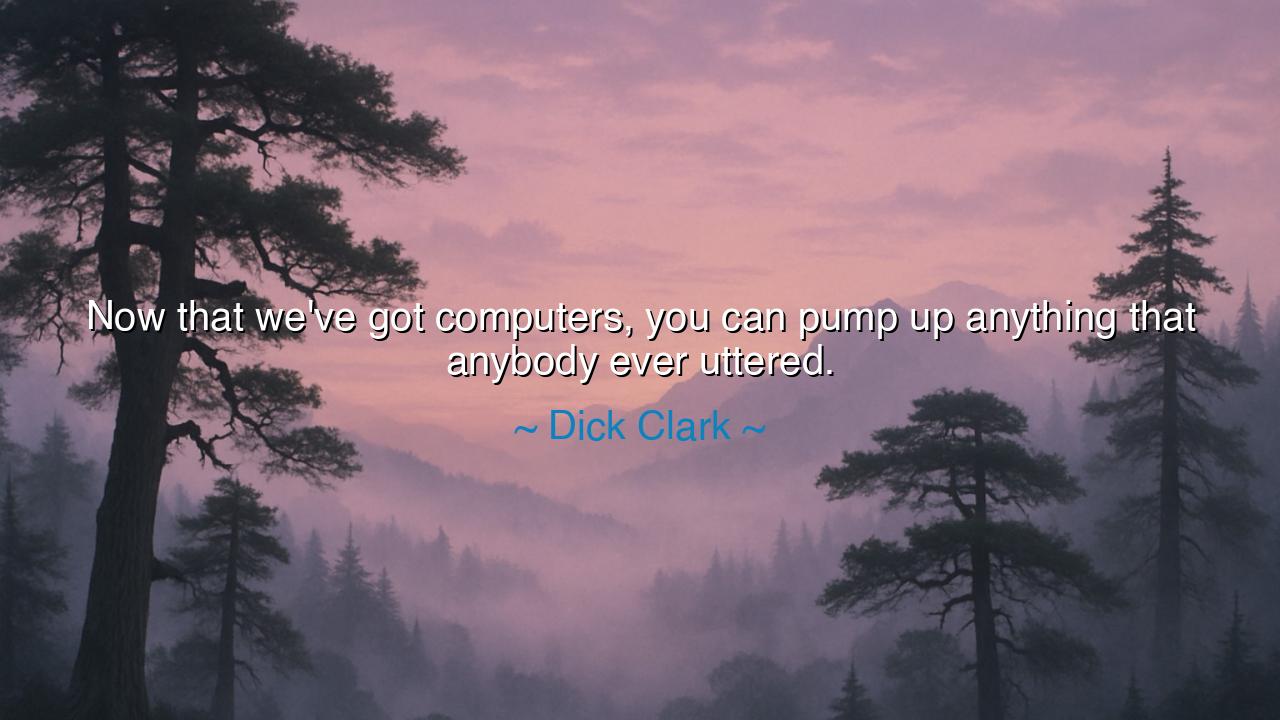
Now that we've got computers, you can pump up anything that






The words of Dick Clark—“Now that we've got computers, you can pump up anything that anybody ever uttered.”—speak to the profound transformation of speech, memory, and influence in the age of technology. In this brief observation lies the awareness that the spoken word, once fleeting and ephemeral, can now be amplified, recorded, and manipulated. Computers grant us power over communication, enabling voices to echo far beyond the moment of their utterance, for both creation and distortion. Clark’s insight invites reflection on the eternal tension between truth, memory, and technology.
In his statement, we see a recognition of both opportunity and peril. The power to “pump up” words can elevate knowledge, inspire action, and spread wisdom to the far corners of the world. Yet it also carries the risk of exaggeration, misrepresentation, or manipulation. The ancients, from Socrates to Cicero, warned of the dangers of rhetoric untethered from virtue: speech can heal or harm, clarify or deceive. Clark’s words echo this concern, reminding us that the technologies we create amplify not only truth but also folly, and that discernment must accompany innovation.
The origin of this quote lies in the early era of digital media, when computers and electronic editing enabled voices and performances to be captured, enhanced, and replayed with unprecedented precision. Clark, a master of media and music broadcasting, understood the transformative power of these tools. Artists, politicians, and public figures could now manipulate recordings, remix speeches, and project influence in ways previously unimaginable. In his words, we hear both wonder at this new capability and a cautious acknowledgment of its responsibility.
History provides striking parallels. Consider the orators of ancient Rome, such as Cicero, whose speeches were recorded, copied, and disseminated throughout the Republic. Words could inspire armies, sway senators, or provoke riots, and their legacy endured for centuries. Yet even in that age, the power of speech could be amplified or distorted, depending on the skill and intent of those who wielded it. Clark’s reflection on computers is the modern echo of this ancient truth: the tools of amplification magnify not only content, but consequence.
Clark’s insight also touches upon the ethical dimension of communication. With computers, words gain permanence and reach, turning fleeting utterances into enduring influence. This power demands wisdom. The ancients understood that speech is sacred and dangerous alike; the philosopher-king must speak with care, the teacher must guide truthfully, and the citizen must discern critically. Similarly, Clark implies that in the digital age, we must respect the weight and consequence of amplified words, recognizing that what is broadcast widely can shape perceptions, decisions, and history itself.
Consider the modern story of media manipulation and viral messaging. Tweets, speeches, and recordings, once ephemeral, can now be edited, remixed, and amplified to influence elections, culture, and public opinion. This is the very power Clark foresaw: computers allow anyone to elevate or distort what was once spoken, creating ripples far beyond the moment. His words serve as a warning and a guide, teaching us to approach both communication and reception with vigilance, ethics, and critical thought.
The lesson embedded in Clark’s observation is timeless: tools that amplify voices must be paired with responsibility and discernment. As we create, share, and consume information, we must remember that words carry weight, and that amplification multiplies both virtue and vice. Computers, like the printing press or the megaphone before them, expand influence, but they do not absolve the user from moral and intellectual accountability.
And so, my children, remember this eternal guidance: speak wisely, listen critically, and treat the words of others with respect, for in the age of computers, every utterance can echo across time and space. Amplify truth, temper exaggeration, and weigh the consequences of speech. As Dick Clark observed, technology gives us power over words—but it is wisdom that ensures they illuminate rather than deceive, inspire rather than corrupt, and endure as beacons of understanding in a world ever more connected.






AAdministratorAdministrator
Welcome, honored guests. Please leave a comment, we will respond soon